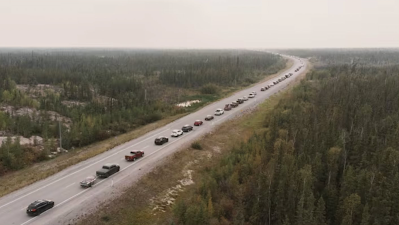 |
| A long line of vehicles on Highway 3 leading out of Yellowknife, Northwest Territories, Canada. The entire city of 20,000 was evacuated due to an advancing wildfire. Photo by Pat Kane/Reuters. |
The last of the 20,000 or so residents of Yellowknife, Northwest Territories were on their way out of town Friday as a huge wildfire bore down on that city.
Yellowknife is known for its frigid winter climate, but the story now, like most of Canada has experienced at one time or another this year is fire.
As the massive fire bore down on Yellowknife, and local authorities this week decided the best course of action was to get everyone out by Saturday, when the wildfire is expected to arrive.
As you can imagine, abruptly evacuating a city of 20,000 is pretty chaotic. Plus, it's a major hub for all the little villages up in that corner of Canada. It looks surprisingly large for the population in photos, complete with a busy downtown and high rises. A huge region does its commerce in Yellowknife. So the evacuation is incredibly disruptive to say the least, even if ultimately, no homes there are destroyed by the fire.
A majority of Yellowknife residents have been able to drive out of the city despite the nearby fires and areas of dense smoke. The traffic was stop and go, however, as motorist made their way through smoke, and carefully had to pick their way through areas already burned over.
People without easy access to cars, and the elderly or those with health problems and some families were scrambling to get flights out of Yellowknife.
Flights out of Yellowknife got bogged down by smoke and other weather conditions and not everybody who wanted to leave on planes Thursday could. So people who waited for hours at the airport were told to go home and come back Friday morning. About 21 flights with room for about 2,000 people were scheduled to depart Yellowknife on Friday.
Weather conditions are ominous for Yellowknife. A passing storm system might produce a couple of scattered rain showers today and tonight, but those won't be nearly heavy enough to disrupt the fires.
Strong winds behind the storm gusting to 30 mph from the northwest and west, would drive the fire toward Yellowknife.
Officials were trying to save the city by bulldozing fire breaks around neighborhoods and turning on as many sprinklers as they could.
The whole situation is reminding people of the massive fire that destroyed large sections of Fort McMurray, in northern Alberta back in 2016.
To add to the chaos, after you evacuate people, where do you put them? The larger cities of Edmonton and Calgary, Alberta are doing their best to accommodate as many fire refugees as they can.
They might have to find room for more.
Another large fire is threatening a much larger city than Yellowknife. Kelowna, British Columbia with a population of over 130,000 is also under siege from an immense wildfire. So far, there's no need to evacuate that entire city, but at least 2,400 people have been evacuated. Already an unknown number of homes have been destroyed.
 |
| A wildfire looms above houses near Kelowna, British Columbia this week. Phot by Ben Nelms/CBC. |
Evacuations were also underway around Lytton, British Columbia. If the name of that tiny town rings a bell, it's because in June, 2021, the community record Canada's hottest ever temperature - 121 degrees. The next day, a wildfire destroyed most of Lytton.
Fires have been burning much of the summer in British Columbia. The blazes got more intense this week as record heat enveloped much of the province.
This has easily been the worst year on record for Canadian wildfires. As the Washington Post reports:
"More than 1,000 active fires were raging across Canada on Friday as a combination of record-challenging heat, climate change and long term drought has exacerbated the wildfire season. This year's fires have burned twice as much land in the country as any previous season - an area equivalent to Alabama."
I can't get through this post without mentioning climate change. Sure, summers are variable and entire huge nations like Canada can have dry and warm years as well as chilly, wet ones.
But the dry, warm year of 2023 has been made worse by climate change. What might have been routine warm spells and scattered wildfires decades ago have evolved now into record heat and huge conflagrations.
At this point, the only thing that will firmly put an end to Canada's wildfire hell is winter.

No comments:
Post a Comment